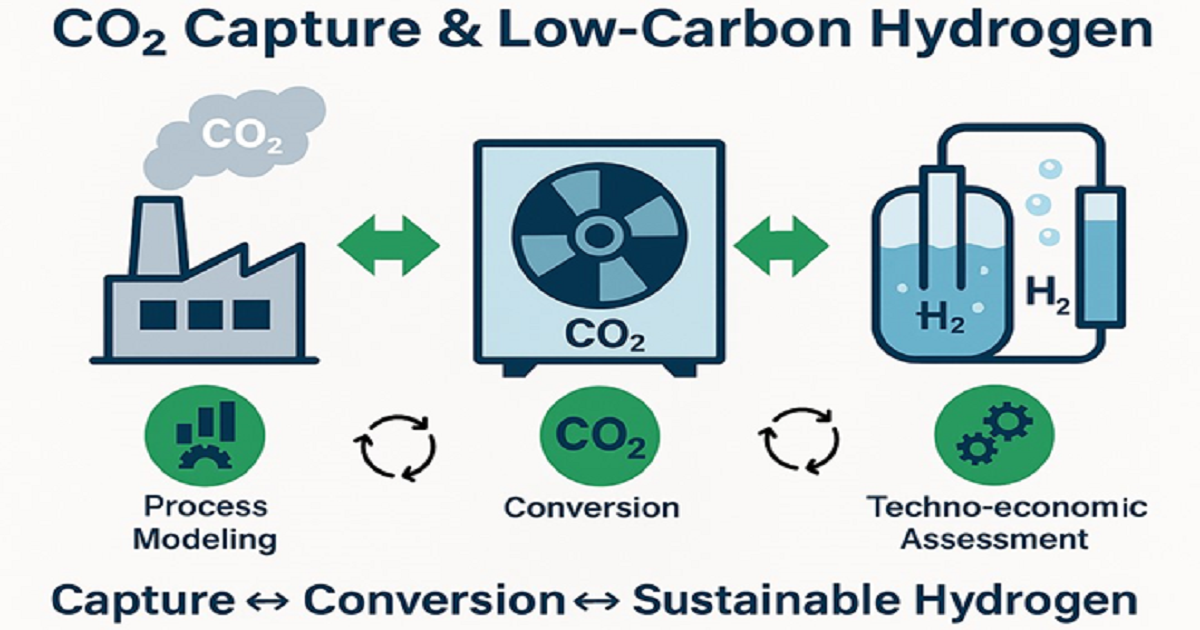- 2.8Impact Factor
- 5.5CiteScore
- 15 daysTime to First Decision
CO2 Capture and Low-Carbon Hydrogen Production Processes
This special issue belongs to the section “Energy Systems“.
Special Issue Information
Dear Colleagues,
This Special Issue aims to gather high-quality research and review contributions that address novel advancements in CO2 capture and the low-carbon production of hydrogen. Submissions may explore integrated strategies that mitigate carbon emissions while enabling sustainable hydrogen generation. Topics include, but are not limited to, the following:
- Emerging CO2 capture technologies, including direct air capture (DAC), post‑combustion and pre‑combustion capture, oxy‑fuel and chemical‑looping combustion, adsorption, absorption, membrane systems, and hybrid methods.
- Innovative low-carbon hydrogen production processes, such as green hydrogen via electrolysis (PEM, AEL, SOEC, etc.), sorption‑enhanced water‑gas shift (SEWGS), direct air capture‑electrolysis integration, and chemical‑looping reforming.
- Coupled and integrated process designs that co-produce hydrogen while capturing CO2, such as sector-coupled DAC + hydrogen systems and catalytic hybrid processes.
- Modelling, techno-economic evaluation, lifecycle assessment, process intensification, and scale-up studies for CO2 capture and hydrogen systems.
- Novel materials, catalysts, reactors, and membranes that enhance efficiency, selectivity, durability, and cost‑effectiveness in CO2 capture and low-carbon hydrogen production.
For this Special Issue, we welcome research articles, comprehensive reviews, communications, and case studies that provide innovative, practical, and sustainable solutions toward a decarbonised hydrogen economy.
Dr. Shervan Babamohammadi
Dr. Salman Masoudi Soltani
Dr. Reza Andalibi
Guest Editors
Manuscript Submission Information
Manuscripts should be submitted online at www.mdpi.com by registering and logging in to this website. Once you are registered, click here to go to the submission form. Manuscripts can be submitted until the deadline. All submissions that pass pre-check are peer-reviewed. Accepted papers will be published continuously in the journal (as soon as accepted) and will be listed together on the special issue website. Research articles, review articles as well as short communications are invited. For planned papers, a title and short abstract (about 250 words) can be sent to the Editorial Office for assessment.
Submitted manuscripts should not have been published previously, nor be under consideration for publication elsewhere (except conference proceedings papers). All manuscripts are thoroughly refereed through a single-blind peer-review process. A guide for authors and other relevant information for submission of manuscripts is available on the Instructions for Authors page. Processes is an international peer-reviewed open access semimonthly journal published by MDPI.
Please visit the Instructions for Authors page before submitting a manuscript. The Article Processing Charge (APC) for publication in this open access journal is 2400 CHF (Swiss Francs). Submitted papers should be well formatted and use good English. Authors may use MDPI's English editing service prior to publication or during author revisions.
Keywords
- CO2 capture technologies
- low‑carbon hydrogen production
- green hydrogen (electrolysis: PEM, AEL, SOEC)
- chemical‑looping combustion/reforming
- sorption‑enhanced water‑gas shift (SEWGS)
- direct air capture (DAC) integration
- hybrid CO2 capture and hydrogen systems
- techno‑economic analysis & lifecycle assessment
- advanced membranes and catalysts
- process modelling and intensification

Benefits of Publishing in a Special Issue
- Ease of navigation: Grouping papers by topic helps scholars navigate broad scope journals more efficiently.
- Greater discoverability: Special Issues support the reach and impact of scientific research. Articles in Special Issues are more discoverable and cited more frequently.
- Expansion of research network: Special Issues facilitate connections among authors, fostering scientific collaborations.
- External promotion: Articles in Special Issues are often promoted through the journal's social media, increasing their visibility.
- Reprint: MDPI Books provides the opportunity to republish successful Special Issues in book format, both online and in print.


